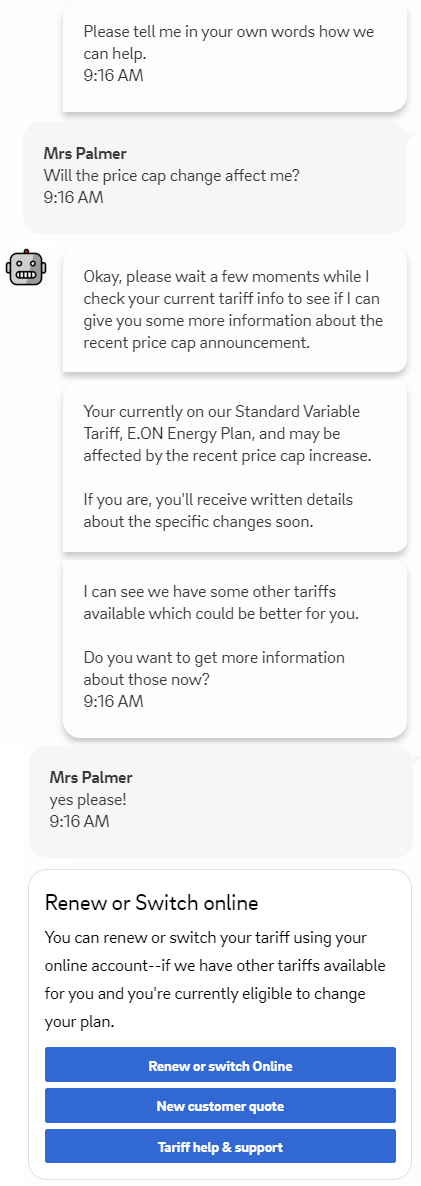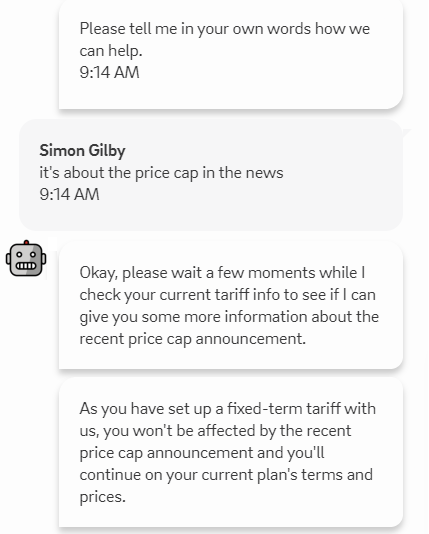Price change mitigation
Reducing high-volume surge demand during a price change event, by reassuring and redirecting customers.
Initiative overview
Background
A large retail energy supplier, taking over 200,000 voice calls and 60,000 chats every week. The prices for some or all tariffs change on an irregular schedule, and is a significant cause of unmanageable demand spikes when this happens. Price change events are often sector-wide and have a lot of media attention.
Problem
During a price change event, our contact centres will become overwhelmed with customers wanting more information. This causes long queue times, poor service levels and spin over the following weeks and it can take over a month to recover performance back to normal levels.
Over half of the customer base will be on a fixed-price plan, and the price change will generally not affect them—they’re getting in touch for reassurance more than anything else.
Solution
I designed a voice, chat & social messaging bot that could be deployed tactically during a price change event, and then switched off when it was over. Each event was slightly different and small content or logic tweaks might be required each time.
The bot looks up a customer’s tariff information, presents it back to them and lets them know if the price change will affect how much they pay. It also provided links to more comprehensive online information about the event, as well as third-party organisations that help people who are struggling to pay.
If the customer wants to find a cheaper, or fixed, deal the bot will handshake them into another bot (or web/app native journey) to get a quote for all available plans.
Design approach
With a lot of insights and customer research from historic price changes, we built out a set of personas to help us with the design and direct the kind of content we would need for this bot.
| Persona | Demographic | Bio | Needs |
|---|---|---|---|
| Mark | 50 year old married father of two from London | He works as a financial advisor and is on a fixed price plan for his energy. He is calling to make sure that his plan is still in place and that he will not be affected by the upcoming price increase. | Reassurance |
| Joanne | 35 year old single mother from Manchester | She is a teacher and has just received her energy bill which states that her costs will be increasing. She is calling to understand what the increase will mean for her and to try to negotiate a better deal. |
Understanding Better offer |
| Emma | 28 year old professional living in Glasgow | She is on a standard energy plan and is calling to find out what the price increase will mean for her and her household. She is hoping that there may be a way to reduce her costs in the face of the increase. |
Extra help Better offer |
| John | 65 year old retired engineer from Birmingham | He is on the cheapest available plan and is calling to find out what the price increase will mean for him. He is concerned that the increase may make it difficult for him to manage his costs, as he is already living on a fixed income. |
Extra help Third-party support |
Reassurance and redirection
The primary purpose of the bot is to reassure & contain customers who aren’t affected by a price change, redirect to extra information and resources to those who are confident to help themselves, and thus freeing up human agents to help those people who really need support.
Benefits
Around 40% of customers were fully contained in the bot during price change events—saving up to 800 agent-hours each week during each event
Chat screenshots of version 1.0


